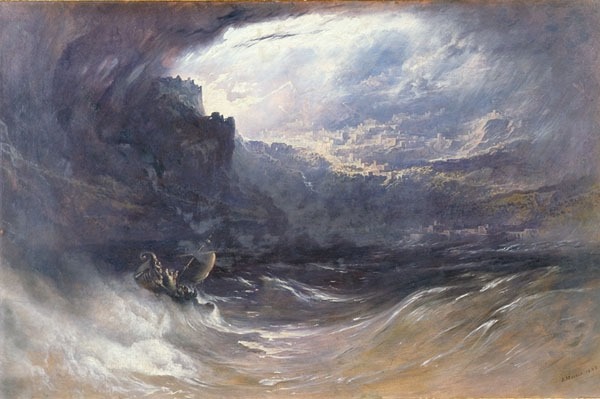Ruach HaYam teaching presented by Penina Weinberg at Congregation Eitz Chayim, 136 Magazine Street, Cambridge, MA – July 18, 2019. 6:45pm.
(Scroll to end for logistics)
[Banner John Martin, The Deluge, 1834. At Yale Center for British Art.]
In this class with Ruach HaYam *** (a queer Havurah based in Cambridge, MA) we will wrestle with finding meaning in some of the harsh passages of Torah. All of us know of such passages, which shock and discomfort us in their violence and inhumanity. As queer readers of the Hebrew Bible, how do we understand them? And in struggling to understand, can we illuminate the harsh passages of our own lives? Our reference points will be the teachings of Rabbi Abraham Joshua Heschel, Rabbi Victor Reinstein (at Nehar Shalom in Jamaica Plain), and Judith Plaskow. As we read them, we will consider how we react to their teachings.
Rabbi Reinstein writes: “On the surface of Torah there is often violence and strife, as in life. Sometimes on the surface itself, shimmering as a crystal fount, and sometimes beneath the surface, there is a river of peace that runs through Torah into whose flow we enter by engaging and wrestling with what Rabbi Abraham Joshua Heschel calls the “‘harsh passages.'”
Rabbi Heschel writes “In analyzing this extremely difficult problem, we must first of all keep in mind that the standards by which those passages are criticized are impressed upon us by the Bible, which is the main factor in ennobling our conscience and in endowing us with the sensitivity that rebels against all cruelty.
We must, furthermore, realize that the harsh passages in the Bible are only contained in describing actions which were taken at particular moments and stand in sharp contrast with the compassion, justice and wisdom of the laws that were legislated for all times.” [God in Search of Man : A Philosophy of Judaism]
Judith Plascow writes: “[I]f in theory, it is entirely fitting to read about sexuality on Yom Kippur, the actual content of Leviticus 18 is deeply disturbing… [C]hanting it as sacred text colludes in promoting its values. In this situation, the question becomes not so much whether to read or not to read, but how to read, interpret, and appropriate the text in ways that are transformative.” [Beginning Anew: A Woman’s Companion to the High Holy Days]
For a personal commentary, read my post
Penina Weinberg is an independent Hebrew bible scholar whose study and teaching focus on the intersection of power, politics and gender in the Hebrew Bible. She has run workshops for Nehirim and Keshet and has been teaching Hebrew bible for 10 years. She has written in Tikkun and HBI blog, and is the leader and founder of Ruach HaYam.
** Logistics**
Study starts promptly at 7:15 pm. We open the doors at 6:45 for schmoozing. Feel free to bring your own veggie snack for the early part. A parking consideration is in effect for the three blocks around EC during all regularly scheduled events. It is a good idea to put a note in the windshield that you are attending an event at EC.
Accessibility information: all gender/accessible bathrooms, entry ramp.
*** Ruach HaYam study sessions provide a queer Jewish look at text, and are welcoming to any queers and allies, to any learning or faith background, to all bodies, and friendly to beginners.***
